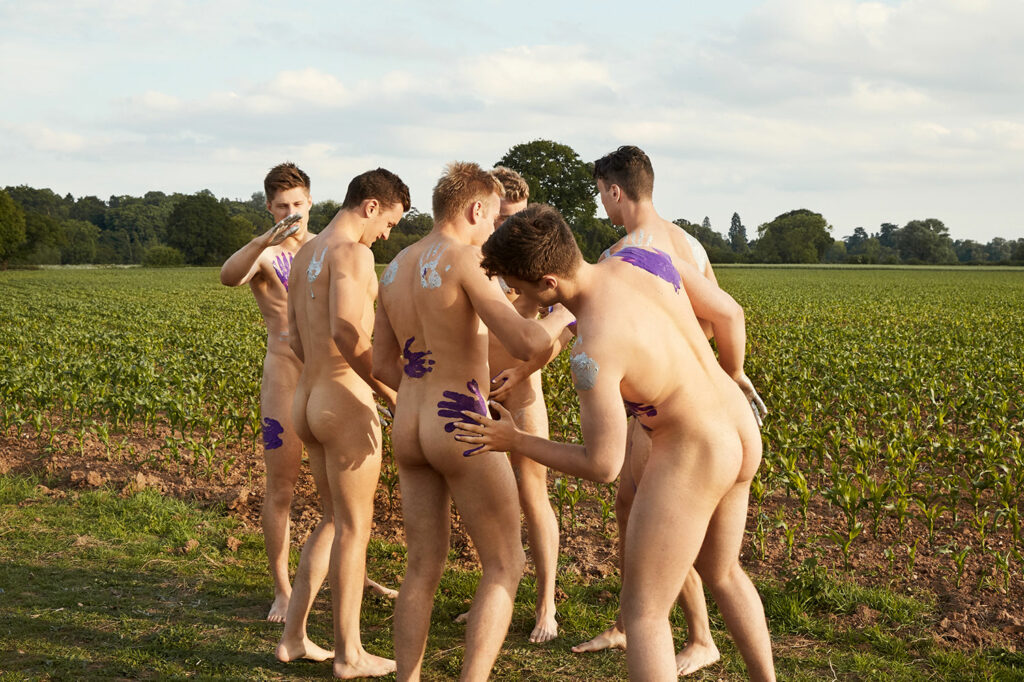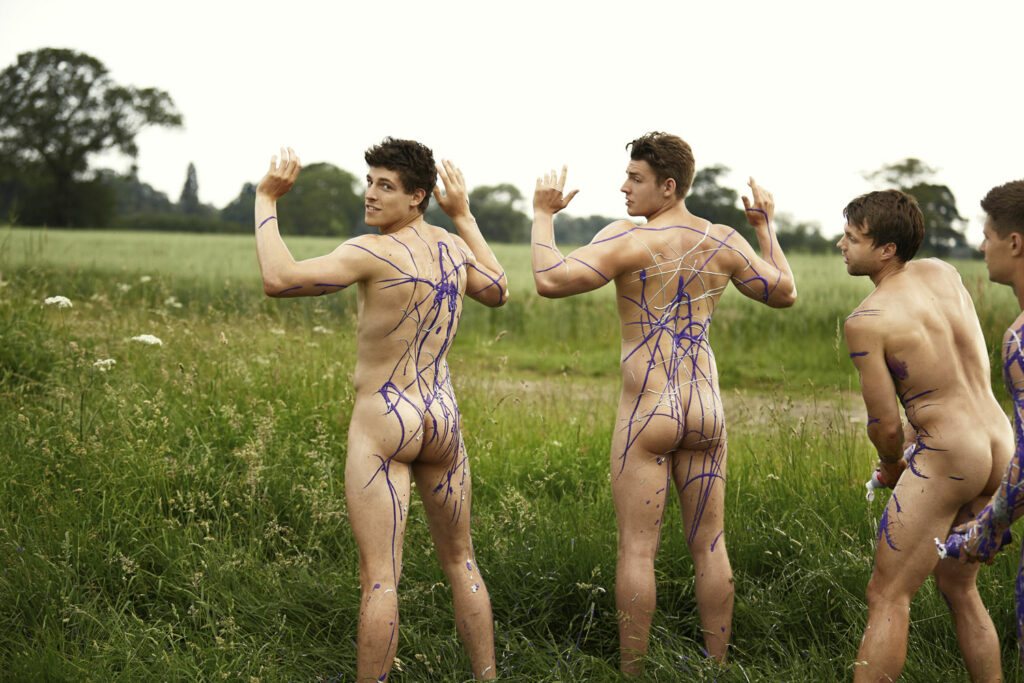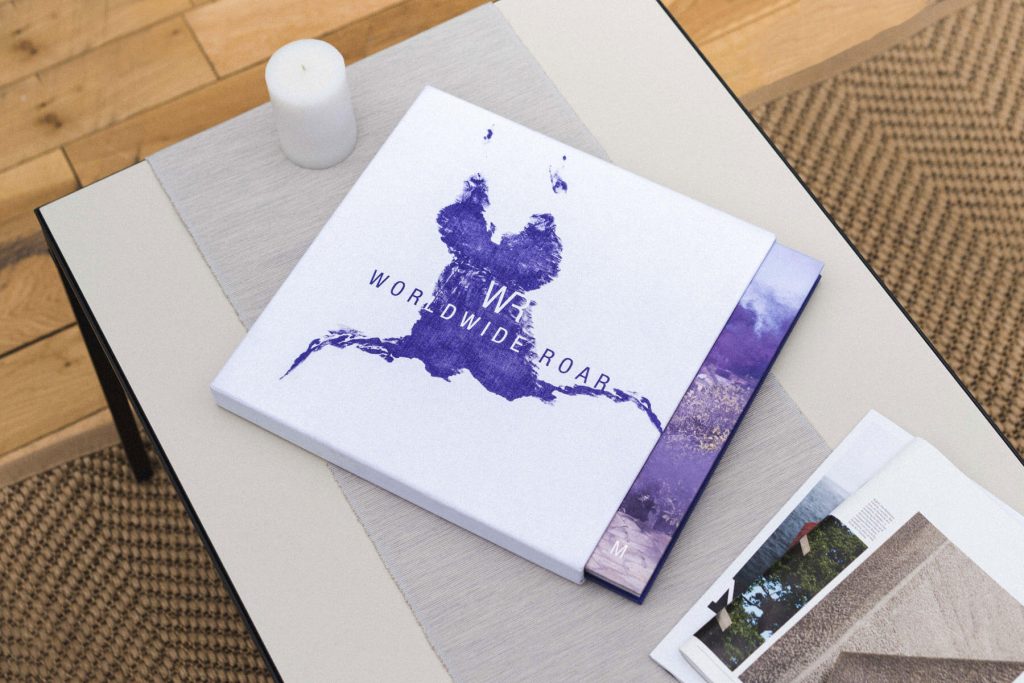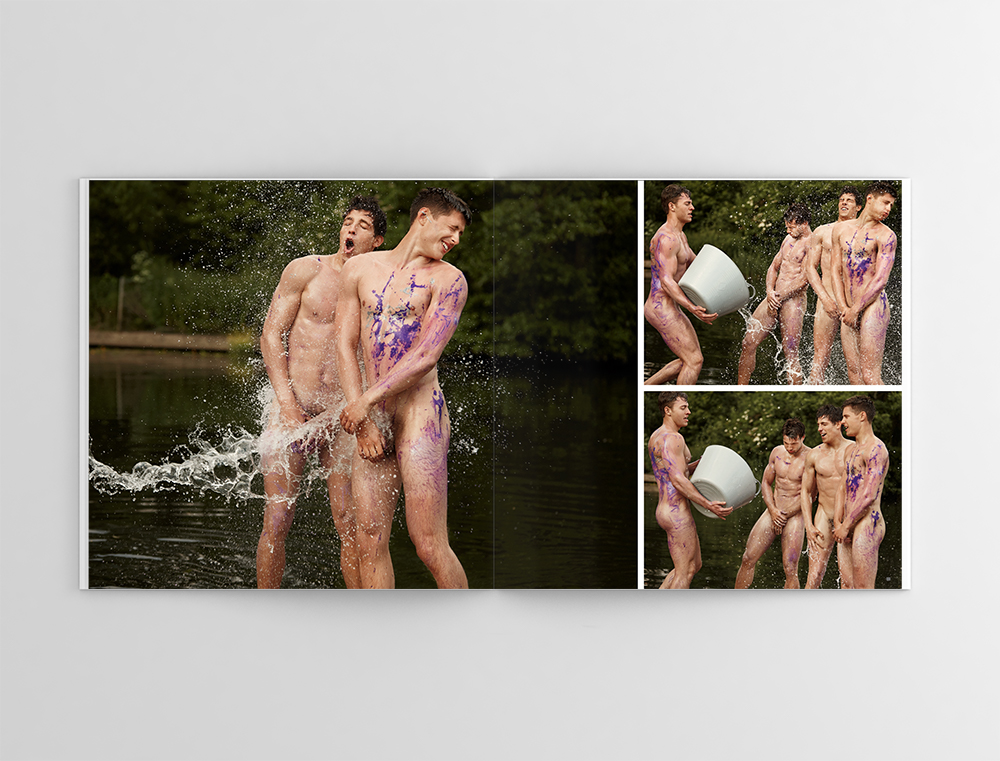Check out ‘The Changing Room’ – order our first poetry book
Worldwide Roar is now BAREFOOT MAN! Learn more

Stay up to date with our latest news, competitions and offers. We look forward to staying in touch.
For our third blog post for Mental Health Awareness Week 2021, we go back to 2015 and our famously cheeky ‘handprints’ shoot! We know it’s a crowd pleaser, but this shoot is also very much about a crucial aspect of how men too often neglect their own wellbeing and the wellbeing of others. It’s about intimacy and connection.
The world is changing fast, and how we interact with each other is possibly changing faster than anything else. Many of us now give more attention to screens and keyboards than to each other. Of course, that has been particularly true during the pandemic – screens and keyboards have been the only way to reach out and stay in touch.
But even before the pandemic hit us all, there had been a growing loss of human contact, even though we might have felt more connected than ever. Many of us were glued to our screens, not looking at each other, not talking, not touching.
The nudity in the WR project brings our participants a sense of intimacy and physical freedom with other men that has been lacking for many of us. It makes them conscious of that absence of connection. In 2015 this was something we wanted to explore further, and we decided that handprints were the way to do it.
Touching each other with paint helped the rowers in these images to break through barriers that all men learn to put up as boys. It also allowed them to put that their commitment to connection on the record.
Now, as vaccination offers the hope of a return to more physical contact, let’s use this opportunity to make mindful intimacy and ‘real world’ connection a more conscious part of how we care for ourselves and each other.

https://www.mentalhealth.org.uk/campaigns/mental-health-awareness-week
https://theskillcollective.com/blog/5-mens-health-resources
https://www.healthdirect.gov.au/mens-mental-health
For the second in our series of blogs for Mental Health Awareness Week 2021, we go back to 2014. It was a big year for us. We had reformatted our calendar and changed our name to Warwick Rowers. We had set up the registered charity Sport Allies to build on our message, and adopted shared new colours of purple and silver for both projects.
Having a bigger canvas and a renewed sense of purpose inspired us to begin paint shots with these two great colours – but the choice was not just an aesthetic one! Silver is often associated with healing and balance, and purple has become the recognised colour of challenging homophobia and transphobia. It seemed like a good start to promoting healthier masculinity.
In the first chapter of our book, Manifesto, we used images from this shoot to make an important point about male mental health: men must consciously consider their identity as men. Are they truly being themselves or are they struggling to live up to outdated rules of masculinity that have been imposed upon them by their parents, their schools, their peers and by the media culture in which we are all immersed?
We had already seen how these rules had been applied to the men in the WR project. In particular, our project’s stance against homophobia led some people to assume that all the men in the images must be LGBT+. Why, after all, would a straight man take his clothes off to challenge homophobia?
Our response was to ask: why wouldn’t he? We felt it was important to challenge these narrow assumptions about who men could be, and when we looked back at our 2014 paint shoot, we realised it was very much about our relationship to rules.
Our inspiration for this shoot came from Jackson Pollock, the American artist who rose to fame in the mid twentieth century. Pollock’s abstract expressionist school of painting replaced conventional brushwork with frenetic splashing and pouring of paint. For us, it is important that Jackson Pollock didn’t start in a void. He looked at the rules, thought about them, worked with them, understood them, and then broke them.
There are so many rules of masculinity that limit men, like: don’t show emotion; never make yourself vulnerable; always put practicality ahead of joy – and many, many more!
We invite all men to become more conscious of the rules they live by, and then feel free to create new ones.
That’s the first of our ‘new principles for healthier masculinity’ and it sets the course for the rest of this week, when we will be bringing you further thoughts we’ve had as a project about what some more of those new principles might be.

https://www.mentalhealth.org.uk/campaigns/mental-health-awareness-week
https://theskillcollective.com/blog/5-mens-health-resources
https://www.healthdirect.gov.au/mens-mental-health
This week is Mental Health Awareness Week, with a focus on nature. At WR we have embraced nudity in nature as a way of helping men to reconnect with the world around them, so what better time to remind everyone of how central male mental health is to the entire WR project?
Our most recent art photography book, Manifesto, sets out five principles based on everything we have learned as a project – with dazzling images and our customary sense of fun, we hope!
This book and our entire project considers what healthy masculinity looks like, and how better male mental health might make the world a better place for all of us.

By asking an apparently simple question about how we can look at men, WR aims to show how much the heterosexual male gaze continues to dominate our culture – at everyone’s expense.
We want to draw attention to the countless ways that men, particularly heterosexual men, still benefit from unspoken and unconscious privilege in many aspects of life – in the workplace, in politics, in the media, in relationships and, of course, in sport.
We also want to raise awareness that these benefits come at a price. Many men feel unable or unwilling to live up to the ideals of masculinity, resulting in mental health distress that often leads to wider social problems.
By taking a fresh look at men, and supporting men to see themselves differently, too, we hope to raise awareness of how the hidden rules of masculinity impact on every one of us, including the men who appear to benefit the most.
We also want to prove that you can have a truly great time while making a serious point!

https://www.mentalhealth.org.uk/campaigns/mental-health-awareness-week
https://theskillcollective.com/blog/5-mens-health-resources
https://www.healthdirect.gov.au/mens-mental-health
You need to load content from reCAPTCHA to submit the form. Please note that doing so will share data with third-party providers.
More InformationYou need to load content from Turnstile to submit the form. Please note that doing so will share data with third-party providers.
More InformationYou need to load content from reCAPTCHA to submit the form. Please note that doing so will share data with third-party providers.
More Information